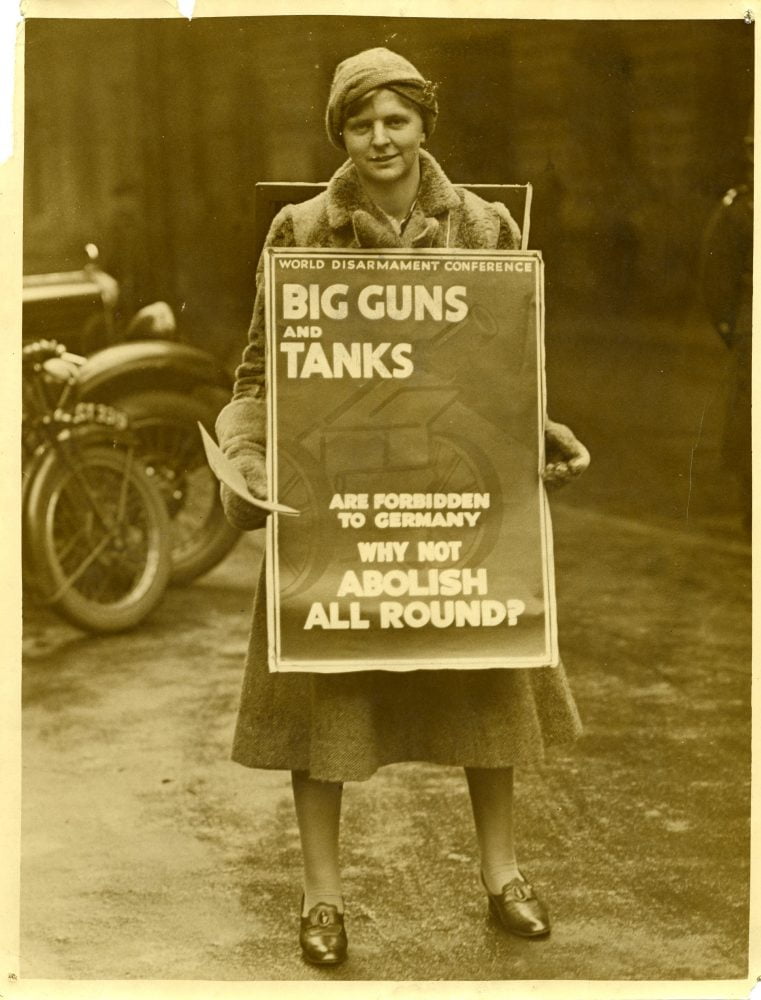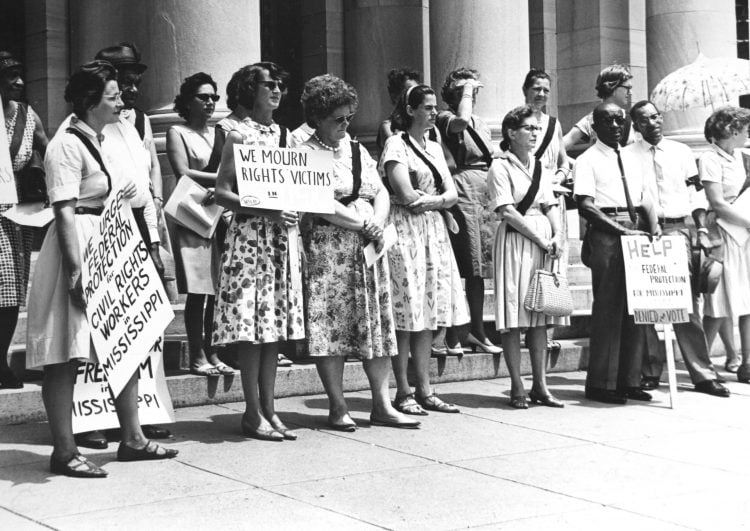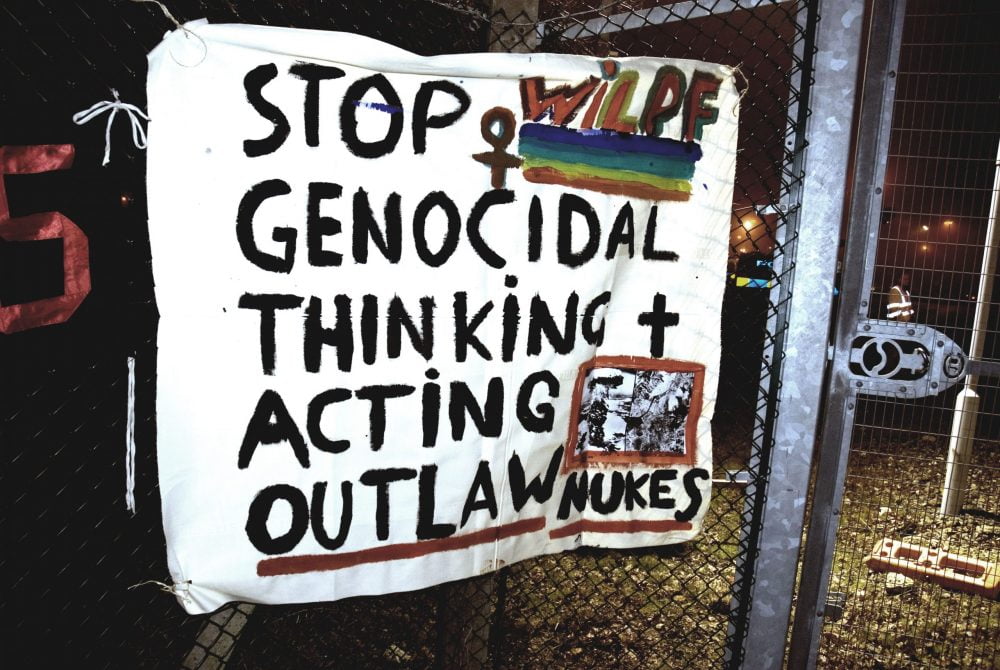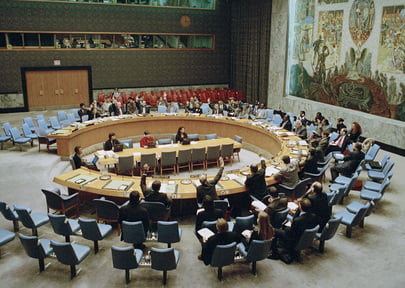


WILPF collected six million signatures on a petition demanding global disarmament, which was delivered to the 1933 World Disarmament Conference in Geneva.


WILPF attended the founding UN Conference on International Organization in San Francisco. Two years later, WILPF was granted consultative status with the UN Economic and Social Council (ECOSOC).







Disclaimer: Much of this history can be said to have been written from a 'Global North' perspective, even though our National Sections from all over the world have a rich and amazing history. This bias is in part due to the fact that most of the easily accessible archives are those of WILPF Sections in the USA, Canada, Australia and the United Kingdom. We absolutely welcome any contribution to our timeline from other Sections - feel free to email us at membership@wilpf.org.
In 1914, suffragists throughout Europe had planned to meet to discuss the movement’s progress. But as World War I broke out, their plans were disrupted and they never met.
Despite the challenges they faced, they persisted. One year later, 1,136 suffragists from twelve countries met in The Hague, the Netherlands. Together, they decided to create the International Women’s Congress – later renamed the Women’s International League for Peace and Freedom – with a goal to develop mediation strategies to end the war and, ultimately, eradicate the root causes of war.
And so, on 28 April 1915, WILPF was established.

Read the resolutions that our bold foremothers established during this meeting, which was to be our very first Congress. We’ve since re-convened every three years.

In 1919, following our second Congress, we were among the very first to denounce the Treaty of Versailles: Our foremothers understood that it created the conditions for future warfare. They also decided to move WILPF’s headquarters to Geneva, Switzerland, to be close to the offices of the League of Nations (which was later replaced by the United Nations).
The members of WILPF spent the 1920s working to promote international arbitration and mediation mechanisms in cases of disagreements between nations.

La Maison Internationale de la Paix (the International House of Peace in English) served as WILPF’s picturesque headquarters as of 1919. It was rented to them by its owner, the man who created Esperanto. Watch this short video dating back to the 1920s for a glimpse of this beautiful house!
WILPF is a membership-driven organisation, with members working at the local, regional, and national levels by coming together in semi-autonomous National Sections and Groups.
Between 1919 and 1925, National Sections began cropping up outside of Europe – including in Nepal, Mexico, the United States, Canada, Japan, India, Australia, and Uruguay. By 1921, we had 25 Sections worldwide!

In 1926, WILPF’s United Kingdom Section organised The Great Peace Pilgrimage to demand the British Government agree to settle all international disputes through peaceful conciliation and arbitration mechanisms.
During The Great Peace Pilgrimage, 28 women’s and peace organisations united under the banner “Law, Not War” and travelled from all over the UK to reunite in Hyde Park. On the way, they organised meetings and discussions in many different villages!

In the 1930s, our foremothers watched the rise of anti-semitism with much apprehension and mobilised to help Jewish refugees fleeing Nazi Germany.
In 1936, WILPF issued the “Appeal to the Non-Jews of Europe”, which concluded:
We appeal to those who still have the courage and the freedom to do so to speak out and to join us in expressing public execration of all pogroms, open or secret, and of the hideous shame to civilization which Hitler has brought upon Europe.
During the 1930s, we also sent out our very first peace missions to the Balkans, Indo-China, China, Palestine, Mexico, Cuba, Egypt, Haiti, and Middle-East.
Peace missions are one of WILPF’s long-lasting traditions: over the years, members have visited numerous conflict-affected areas, with the aim to report objectively on the situation and raise awareness internationally.
However, this tradition is not without its problems. As Dr. Catia Cecilia Confortini pointed out in her 2012 book Intelligent Compassion: The Women’s International League for Peace and Freedom and Feminist Peace, WILPF had a long-standing practice of engaging in “fact-finding” missions, which (in the Middle East context specifically) who today can be viewed as being inscribed in the tradition of “Orientalist” travels and had similar ambiguous implications. For instance, in 1931, Elisabeth Waern Bugge (WILPF Sweden) traveled to Palestine with the aim to create mixed Jewish and Palestinian WILPF groups. In her report, which was read by WILPF members up to the 1950s, she portrayed Arab women as “ignorant, child-like and backwards” and Muslim men as chauvinistic and full of hatred, as opposed to “modern” Jewish communities.
Watch Kay Camp, former President of WILPF’s US Section and later Vice-President of WILPF International, talk about peace missions.
During this decade, our work also revolved primarily around calling for international disarmament. As more and more members joined us from around the world, we collected six million signatures on our petition demanding global disarmament, which we delivered to the 1933 World Disarmament Conference held in Geneva.


In 1931, Jane Addams, one of WILPF’s founders and our first international president, was awarded the Nobel Peace Prize – at a time when the FBI had dubbed her “the most dangerous woman in America”. This letter, addressed to the head of the FBI, Mr. Hoover, talks of Jane Addams as attempting to “emasculate national security”.

During World War II, WILPF’s President and Vice-President, Gertrude Baer and Clara Ragaz, were staying on different sides of the Atlantic Ocean. By communicating through circular letters, they managed to coordinate efforts to help refugees and ceaselessly denounced the Nazi regime. They saw that, in the face of fascism, the price of peace was freedom and decided that was too high a price to pay. As Anita Auspurg of WILPF’s German Section wrote at the time:
In 1945, WILPF attended the founding UN Conference on International Organization in San Francisco.
At the conference, WILPF promoted the concept of world security based on freedom and justice and not on military power and prestige. Two years later, in 1948, we were granted consultative status as a non-governmental organisation with the UN Economic and Social Council (ECOSOC).
"We are a league for peace and freedom, and now I place freedom first."
Anita Auspurg

Circular letters are sent to a large number of people – like an email newsletter, but through the post!
Did you know WILPF US lost over half of its members at the outbreak of the Second World War? The argument over whether or not war was justified to bring an end to fascism divided the members, as it did for all of Europe. After all, the situation created an opposition between WILPF’s two aims, freedom and peace. Many prominent WILPF members believed that in this case, freedom had to be fought for, even at the price of war.


In the 1950s, much of WILPF’s work focused on pushing for serious studies on the public health impacts and other effects of nuclear radiation. In part thanks to our advocacy, in 1955, the World Health Organization’s assembly adopted a resolution to “study public health problems related to somatic and genetic action of radiation.”
After World War II, WILPFers started seeing education as a crucial part of their work. In 1946, a WILPF group in Pennsylvania launched a campaign called “Art for World Friendship” and exhibited drawings created by children from around the world.
The art pieces show how the children envision a world in which all people live together in harmony and equality, and where war has been abolished. The pictures are now part of Swarthmore College’s Peace Collection.
In 1953, Gertrude Baer, our then-International Secretary, addressed an urgent appeal to the President of the UN General Assembly asking him to throw his whole weight into stopping the war in Korea. Just six months later, the Armistice Agreement was signed.
Over 50 years later, the Korean Peninsula is still divided and continues to be affected by militarisation, the ongoing arms race, the existence of nuclear weapons, and threats of nuclear action. We are working closely with local activists and organisations who strive to create spaces for dialogue, educate community members and governments about the need for a formal end to the Korean War.
During our 1953 Congress in Paris, WILPF declared our intention to participate in ending racism. This commitment would lead our members to actively mobilise against apartheid and in support of civil rights movements. In 2022, reminded by members and the Black Lives Matter movement that racism persists, WILPF’s 33rd Congress renewed this commitment.


During the 1950s and 1960s, WILPF members – particularly in the US – were under close watch by the FBI.
As WILPF members advocated for the end of the Cold War, they were seen as “commies” – supporters of communism and the Soviet Union. Photos from one particularly memorable WILPF reunion over dinner at the home of Kay Camp (above), then-President of WILPF US, even made their way into FBI files! The US National Section had just hosted a delegation of Soviet women to discuss peace and disarmament.

In the 1970s, not only did WILPF Sections mobilise at home to protest against the Vietnam War, but WILPF sent several members on a fact-finding mission to both North and South Vietnam. At the end of the trip, WILPF US delegates signed a peace treaty with the Vietnamese Women’s Peace Coalition, which proved to be a very useful tool in WILPF’s advocacy work going forward. In 1973, WILPF members were even invited to visit Prime Minister Pham Van Dong.
Later on, in January 1973, WILPF delegates met in Hanoi with other international women’s organisations to negotiate peace agreements with Vietnamese government officials.
Listen to Kay Camp’s stories of visiting our sisters in North and South Vietnam, who often asked her to pass notes and messages to their families on the other side of the border.
WILPF helped organise the 1974 NGO Conference Against Apartheid and Colonialism in Africa in Geneva and played an active role in the 1978 International Conference for the Liberation of Southern Africa and Against Apartheid in New Delhi, India.


In January 1968, singer and WILPF member Eartha Kitt was invited for dinner by the US First Lady, Lady Bird Johnson. She shocked guests by very squarely telling her host: “You send the best of this country off to be shot and maimed. No wonder kids rebel and take pot.”

In 1983, WILPF launched a signature campaign known as Stop the Arms Race (STAR). WILPF Sections all over the world collected signatures asking NATO to cancel its decision to deploy Pershing missiles. The campaign was concluded with a mass rally on 8 March in Brussels, just as the petition signatures were presented to NATO leadership.
During the 1980s, WILPF started working more closely on the interlinking of patriarchy and the destruction of nature.
In the introduction of WILPF’s 1983 Congress report, Harriet Otterloo – Chairwoman of WILPF’s Göteborg branch – wrote that “Peace means peace with the earth. Peace work includes knowledge of and respect for the earth. If we destroy air, water and soil because of ignorance or ruthless exploitation, we have nothing to live off or on in peace. Therefore the ecology movement is part of the peace movement.’
Today, a lot of our work still focuses on the environment. Learn about Environmental Peace by downloading our zine! You can also check out our thematic page on the environment to read up on what we do. We also have an environment working group – subscribe to our mailing list!
In 1983, WILPF co-founded Seneca Camp near a US army base to protest against the imminent deployment of nuclear missiles to Western Europe.
The camp was soon dubbed the Women’s Encampment for a Future of Peace and Justice (WEFPJ) and was reserved entirely for women. Learn more about it in our zine or watch this video.
In 1985, WILPF published its first women’s budget, mandating a 50 per cent cut in military spending. It called for the funds to be redirected to development, education, and peace and security for all of humanity.
We’re still campaigning for governments everywhere to move their money from the military to education, peace and security. Join our #MovetheMoney Campaign.

Since the 1990s, WILPF has been at the forefront of raising awareness of the economic, social and political destabilisation and inequalities created by capitalism.
In 2000, WILPF led a coalition of organisations that convinced the UN Security Council to unanimously adopt Resolution 1325 on Women, Peace and Security, which was the first time the Security Council directly addressed the subject of women and armed conflict.
In 2017, years of advocacy efforts by WILPF and other civil society organisations resulted in a major milestone when 122 states voted to adopt the Treaty on the Prohibition of Nuclear Weapons (TPNW) at the United Nations headquarters in New York City.
That same year, the International Campaign to Abolish Nuclear Weapons (ICAN) – of which WILPF has been a proud member since 2007 – was awarded a Nobel Peace Prize in recognition of its successful efforts to make the treaty a reality. TPNW was entered into force on 22 January 2021.
Since 2001, WILPF has also run the PeaceWomen programme to monitor the implementation of UN Security Council Resolution 1325 and advocate for its full and rapid implementation. Today, they are called the Peace, Women and Security program: learn more about them on their website!
In 1999, WILPF launched the Reaching Critical Will (RCW) project in order to increase the quality and quantity of civil society participation in international disarmament fora, such as those that take place at the United Nations.
Today, RCW is the formal disarmament programme of WILPF. Give their webpage a visit!
Over 20 WILPF women were nominated for the Noble Peace Prize in 2005 through the 1000 PeaceWomen Around the World Project.
In 1995, WILPF’s International Secretariat rented a train! The train brought WILPF members from all over the world to Beijing for the UN’s Fourth Conference on Women.
During their three week-long journey from Helsinki, WILPFers hosted exercise classes, conferences, and strategy meetings, and even performed full moon rituals! Watch this video to join these incredible women as they travel to Beijing.

Today, our determination to break down barriers to inclusion and to advocate for justice for everyone has built a representative movement that elevates the voices of peace activists, advocates and allies everywhere – including across Africa, where the number of Sections and Groups has doubled over the past several years.
Recognising the growing threat of climate change and environmental destruction, we have established environmental activism as a key focus of our global movement. From endorsing the Fossil Fuel Non-Proliferation Treaty to advocating for climate action at major international conferences to creating our first-ever Environment Working Group, WILPF is emerging as a leading voice in the fight for a more liveable, sustainable future.
We also continue to work closely with women, activists and networks impacted by conflict, including in Ukraine, Afghanistan and across the Middle East and North Africa region, to demand de-escalation and people-centred solutions for peace.
To learn more about our most recent work, please visit our annual reports for 2021 and 2022.
If you are curious to know more about our history, we’ve put together a list of documents, videos and archives which will guide you on the exciting history of our movement, our foremothers and of feminist peace!


Your donation isn’t just a financial transaction; it’s a step toward a more compassionate and equitable world. With your support, we’re poised to achieve lasting change that echoes through generations. Thank you!

Prior to being elected Vice-President, Melissa Torres was the WILPF US International Board Member from 2015 to 2018. Melissa joined WILPF in 2011 when she was selected as a Delegate to the Commission on the Status of Women as part of the WILPF US’ Practicum in Advocacy Programme at the United Nations, which she later led. She holds a PhD in Social Work and is a professor and Global Health Scholar at Baylor College of Medicine and research lead at BCM Anti-Human Trafficking Program. Of Mexican descent and a native of the US/Mexico border, Melissa is mostly concerned with the protection of displaced Latinxs in the Americas. Her work includes training, research, and service provision with the American Red Cross, the National Human Trafficking Training and Technical Assistance Centre, and refugee resettlement programs in the U.S. Some of her goals as Vice-President are to highlight intersectionality and increase diversity by fostering inclusive spaces for mentorship and leadership. She also contributes to WILPF’s emerging work on the topic of displacement and migration.

Jamila Afghani is the President of WILPF Afghanistan which she started in 2015. She is also an active member and founder of several organisations including the Noor Educational and Capacity Development Organisation (NECDO). Elected in 2018 as South Asia Regional Representative to WILPF’s International Board, WILPF benefits from Jamila’s work experience in education, migration, gender, including gender-based violence and democratic governance in post-conflict and transitional countries.

Sylvie Jacqueline NDONGMO is a human rights and peace leader with over 27 years experience including ten within WILPF. She has a multi-disciplinary background with a track record of multiple socio-economic development projects implemented to improve policies, practices and peace-oriented actions. Sylvie is the founder of WILPF Cameroon and was the Section’s president until 2022. She co-coordinated the African Working Group before her election as Africa Representative to WILPF’s International Board in 2018. A teacher by profession and an African Union Trainer in peace support operations, Sylvie has extensive experience advocating for the political and social rights of women in Africa and worldwide.
In response to the takeover of Afghanistan by the Taliban and its targeted attacks on civil society members, WILPF Afghanistan issued several statements calling on the international community to stand in solidarity with Afghan people and ensure that their rights be upheld, including access to aid. The Section also published 100 Untold Stories of War and Peace, a compilation of true stories that highlight the effects of war and militarisation on the region.
Lorem ipsum dolor sit amet, consectetur adipiscing elit. Mauris facilisis luctus rhoncus. Praesent eget tellus sit amet enim consectetur condimentum et vel ante. Nulla facilisi. Suspendisse et nunc sem. Vivamus ullamcorper vestibulum neque, a interdum nisl accumsan ac. Cras ut condimentum turpis. Vestibulum ante ipsum primis in faucibus orci luctus et ultrices posuere cubilia curae; Curabitur efficitur gravida ipsum, quis ultricies erat iaculis pellentesque. Nulla congue iaculis feugiat. Suspendisse euismod congue ultricies. Sed blandit neque in libero ultricies aliquam. Donec euismod eget diam vitae vehicula. Fusce hendrerit purus leo. Aenean malesuada, ante eu aliquet mollis, diam erat suscipit eros, in.
WILPF uses feminist analysis to argue that militarisation is a counter-productive and ill-conceived response to establishing security in the world. The more society becomes militarised, the more violence and injustice are likely to grow locally and worldwide.
Sixteen states are believed to have supplied weapons to Afghanistan from 2001 to 2020 with the US supplying 74 % of weapons, followed by Russia. Much of this equipment was left behind by the US military and is being used to inflate Taliban’s arsenal. WILPF is calling for better oversight on arms movement, for compensating affected Afghan people and for an end to all militarised systems.
Mobilising men and boys around feminist peace has been one way of deconstructing and redefining masculinities. WILPF shares a feminist analysis on the links between militarism, masculinities, peace and security. We explore opportunities for strengthening activists’ action to build equal partnerships among women and men for gender equality.
WILPF has been working on challenging the prevailing notion of masculinity based on men’s physical and social superiority to, and dominance of, women in Afghanistan. It recognizes that these notions are not representative of all Afghan men, contrary to the publicly prevailing notion.
In WILPF’s view, any process towards establishing peace that has not been partly designed by women remains deficient. Beyond bringing perspectives that encapsulate the views of half of the society and unlike the men only designed processes, women’s true and meaningful participation allows the situation to improve.
In Afghanistan, WILPF has been demanding that women occupy the front seats at the negotiating tables. The experience of the past 20 has shown that women’s presence produces more sustainable solutions when they are empowered and enabled to play a role.